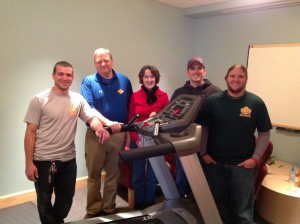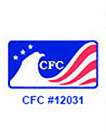Huntsville Fitness Equipment Donates Treadmill for use in NCAC’s Therapy Program

Pictured in photo: Greg Weber, owner of Huntsville Fitness Equipment, and his crew with Jane Orton, NCAC Intervention Director.
Thanks to the generosity of Huntsville Fitness Equipment, the Intervention Department at the National Children’s Advocacy Center (NCAC) has acquired a new commercial treadmill for use in its therapy program. The treadmill will provide NCAC’s clients with repetitive motion techniques to supplement Trauma-Focused Cognitive Behavior Therapy, an evidence-based treatment approach, in order to prime the brain to receive the maximum benefits of trauma work.
Jane Orton, Intervention Director at the NCAC, explains that repetitive motion is an effective method that takes advantage of the neuroplasticity of the brain as well as the brain/body connection. Through repetitive physical activity such as walking, the brain can be reprogrammed from a state of chronic high-anxiety to a calmer, more cognitive state that is more receptive to the benefits of cognitive behavioral therapy.
Studies show that repetitive motion techniques can help in ways that cognitive behavioral therapy alone cannot. When a child has experienced chronic threats, the brain exists in a persisting state of fear. This makes the stress response oversensitive, over reactive, and dysfunctional due to overutilization of brainstem-driven reactions. Such reactions become entrenched over time. Patterned, repetitive rhythmic activity, such as walking, can move the brain from these super-high anxiety states, to calmer more cognitive states, in which the brain is more accessible to relational reward and cortical thinking.
Orton expressed that she is most grateful for the generous donation by Huntsville Fitness Equipment and for the opportunity to be able to provide clients with this form of supplementary therapeutic technique in a safe, child-friendly, indoor environment. She is optimistic that through utilizing repetitive motion a better sense of emotional regulation can be reached by the client – making him or her more receptive to the proven benefits of Trauma-Focused Cognitive Behavior Therapy.










